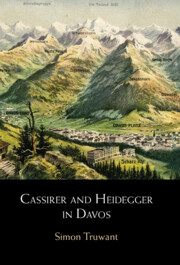1 - Reconstructing the Davos Debate
Published online by Cambridge University Press: 05 May 2022
Summary
Offers a thorough reading of all texts in which Cassirer and Heidegger explicitly engaged with each other’s thought. I first sketch the philosophical context of the Davos debate, which constitutes only one moment of a dispute that started in 1923 and continued until the publication of Cassirer’s The Myth of the State in 1946 (1.1). Second, I argue that the public debate in Davos hinges on three interrelated topics: the proper interpretation of Kant’s philosophy, the human condition, and the task of philosophy. Concretely, I show that Cassirer and Heidegger’s diverging readings of Kant are motivated by their different views on the human condition, and that these views are in turn motivated by different conceptions of the task of philosophy, which I consider to be the fundamental breaking point between these two thinkers (1.2). Third, I explain that the same issues of contention also structure, in the same order and with the same increasing intensity, the entire, 23-year-long Cassirer‒Heidegger dispute (1.3).
Information
- Type
- Chapter
- Information
- Cassirer and Heidegger in DavosThe Philosophical Arguments, pp. 15 - 44Publisher: Cambridge University PressPrint publication year: 2022
